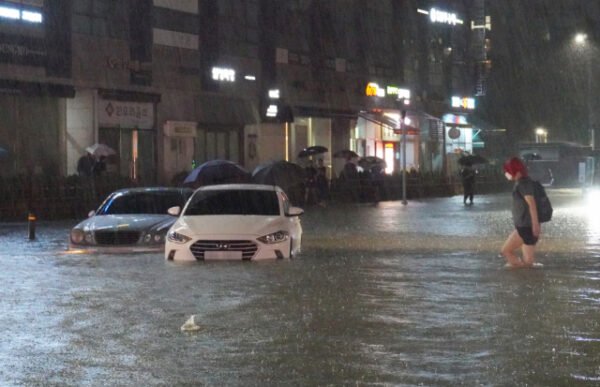사람과 지구 돌봄, 지금 당장 행동할 때
사람과 지구 돌봄, 지금 당장 행동할 때
사람과 지구 돌봄, 지금 당장 행동할 때
By: 마리아 플로로 (서울대학교 국제이주와포용사회센터 자문위원, 아메리칸대학교 경제학과 명예교수)

* 2023년 서울 홍수 사진 (출처: 매일신문)
In many ways, this year 2023 is considered a harbinger of things to come that societies and governments will have to reckon with: climate change, food and water insecurity, and inequality. We are witnessing the drastic consequences of climate destabilization and the warming of the earth resulting largely from human actions: frequent heat waves, intense flooding and droughts, water crises, increased biodiversity loss, reduced agricultural productivity, and faster disease transmissions. Alongside climate change is the evolving crisis of social reproduction or the sustenance of human life and the maintenance and enhancement of the capabilities of people as workers and members of society. This crisis has to do with growing food and water insecurity, heightened health crises brought about by heat waves, air pollution, severe rainstorms and heavy flooding, and fertility rates declining below replacement levels for a growing number of countries.
The effects of climate change are now being felt throughout the world and the impacts of the crisis of social reproduction are unravelling as well. Severe and prolonged droughts have already affected the Sahel and most of East Africa, China, Brazil, western and southwestern United States. Severe storms are also causing extensive damage in South, Southeast and East Asia, and parts of Latin America, and the Caribbean of which tens of thousands of people have perished and become severely impacted by food insecurity. Climate change has additionally intensified water scarcity and stress. Nearly two billion people worldwide don’t have access to safe drinking water (SDG Report 2022), and about half of the world’s population is experiencing severe water scarcity for at least part of the year (IPCC). Major rivers at various times of the year no longer reach the ocean, while reservoirs and lakes are becoming dry, and underground water aquifers depleted. Climate change will only make the water situation even more critical: drier areas will be more prone to drought and humid/wetter areas more prone to flooding. As food, water, and other resources become increasingly strained, fierce competition over scarce natural resources are likely to escalate, significantly increasing the potential for more conflicts. In fact, natural disasters, decline in food production and loss of livelihoods have already dislocated millions of people, particularly those who have little or no resources to cope with or mitigate the adverse effects.
At the same time, an emerging crisis of care and social reproduction continues to accompany economic growth throughout the world. Climate change impacts on health and demographic changes are leading to increases in the number of sick and frail elderly who need care which women disproportionately provide. Additionally, female labor force participation has dramatically increased since the 1960s. As many women worldwide respond to employment opportunities brought about by economic growth, expansion of trade and capital flows, they have reallocated more of their time towards labor market work. Women, as a result, have increasingly taken on the triple responsibilities of income earners, household managers, and caregivers, a situation that inevitably creates stresses and tensions as they try to balance these multiple roles. Moreover, growing urbanization and increasing nuclearization of households, especially in low and middle-income countries, are undermining the traditional caregiving support provided by community-based and kinship networks, so that families are further stressed to meet their care needs.
Policy discussions on the evolving care conundrum remain fragmented and inadequate however, reflecting the low political priority accorded to the rising care needs and the prevailing belief that care issues have little impact on sustainable development. Instead, the customary social norms of filial piety and familial obligations are often emphasized, promoting the idea that families can (and should) find their own solutions to deal with care responsibilities.
This laissez-faire approach to care provisioning continually ignores the persistence of unequal division of labor and distribution of care work within households and the fact that women often employ coping mechanisms such as lengthening their workdays or performing simultaneous work activities that can cause stress and ill health. Growing income polarization and the stagnation of real incomes for many households translate into different solutions for meeting care needs that is conditioned by economic status. The persistence of poverty and economic inequalities have widened the gap between those households that can afford access to market care services and those who are not. Care needs are therefore unevenly met across households leading to ‘care’ deficits or significant costs e.g., foregone employment/earnings, stress, etc. to the principal caregivers. The result has been wide disparities between families with care needs in terms of who have access to care support and those who don’t. The care conundrum will almost certainly be exacerbated with the worsening of the ecological crisis as more disruptions on the care systems occur.
The dual crises of care of people and care of the ecoystem offer unprecedented insights into what we can expect in months and years to come and what actions must be taken. These crises are causing disparate impacts across nations and social groups. Countries with fewer economic resources and weak social and health infrastructures are at a higher risk, not only in the short-term but also in the longer term. Politically underrepresented groups such as racial and ethnic minorities, migrants, and other marginalized groups suffer the most

Importantly, these dual crises unravel gender inequalities and further amplifies them. As hundreds of thousands, if not millions, of people around the world lose their homes, livelihood and jobs, and/or access to food and safe water due to erratic weather patterns, rising temperatures and extreme weather events, many, especially women, are compelled to simultaneously juggle paid work and family care responsibilities Unpaid care work has increased with the heightened care needs of the elderly and the sick, especially when schools, day care facilities health infrastructure, and health services are damaged, closed, inaccessible or overwhelmed.
As governments and policymakers grapple with the challenge of bolstering resilience i.e., the ability to withstand, recover, and adapt to unexpected shocks, they will need to think beyond the effects of these shocks on markets and to pay more attention to heightened social and economic inequalities and the longer term effect of their actions on the health of our ecosystem. A deeper understanding of the contributions of care work and the ecosystem to human survival and well-being and their interdependence can help build mutually reinforcing sustainable development strategies and policies.
Such an objective requires a comprehensive, gendered approach that considers women’s roles in the provision of essential goods and services and the differentiated impacts of climate change. It is crucial that disaster risk management, preparedness and recovery plans as well as government actions towards a resilient healthy ecosystem and a carbon net zero future put care work and the interests and rights of women and girls a key component. As the UNWomen 2020 pointed out, “This is not just about rectifying long-standing inequalities but also about building a more just and resilient world.”





